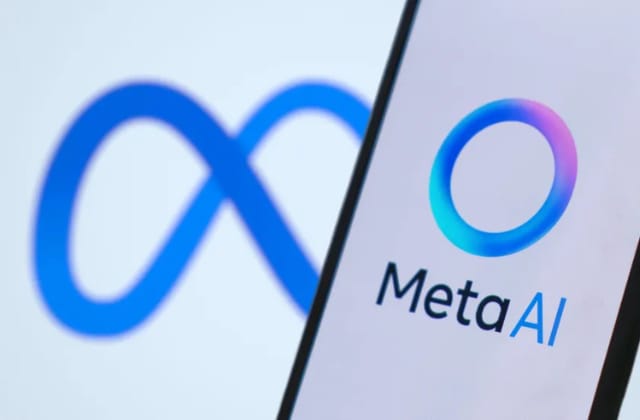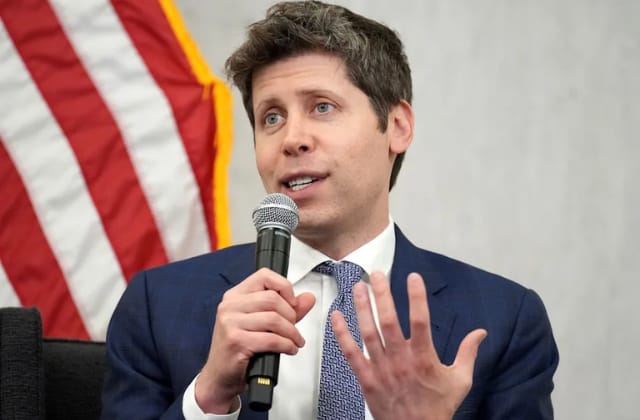- OpenTools' Newsletter
- Posts
- 👾Meta's $600B Superintelligence Infrastructure
👾Meta's $600B Superintelligence Infrastructure
PLUS: EU AI Act Delays | OpenAI's Government Wish List

Reading time: 5 minutes
🗞️In this edition
Zuckerberg commits $600B over three years for AI
Trump administration pressure threatens EU AI regulation
OpenAI lobbies for Federal support for data center buildout
Workflow Wednesday #44: AI for Decision-Makers
In other AI news –
Ant Group pivots to AI-powered healthcare amid China’s ageing boom
Seven more families sue OpenAI over ChatGPT-linked suicides
Google Finance adds Gemini AI tools for smarter stock trading
4 must-try AI tools
Hey there,
Meta announced $600 billion in US infrastructure investment over three years, doubling down on superintelligence after losing $200 billion in market cap two weeks ago when investors questioned the strategy. The EU is considering delays to its AI Act under pressure from Trump's tariff threats and 46 European companies demanding grace periods before enforcement begins. And OpenAI's lobbying for 35% tax credits on data centers while its CFO suggested then walked back comments about government backstopping infrastructure loans.
We're committed to keeping this the sharpest AI newsletter in your inbox. No fluff, no hype. Just the moves that'll matter when you look back six months from now.
Let's get into it.
What's happening:
Meta said Friday it will invest $600B in US infrastructure and jobs over the next three years, including AI data centers, as the social media giant races to build infrastructure to power its AI ambitions.
Meta has doubled down on AI, with a target of achieving superintelligence, a theoretical milestone where machines outthink humans.
CEO Mark Zuckerberg told President Trump that Meta will invest "at least $600B" in the US over the next several years at a White House dinner in September.
Zuckerberg said Meta is building compute because "it's the right strategy to aggressively front-load capacity so we're prepared for the most optimistic cases," on the company's recent earnings call.
Meta has forecast "notably larger" capital expenses next year thanks to AI investments, including aggressively building data centers.
Last month, Meta sealed a $27B financing deal with Blue Owl Capital to fund its Louisiana data center, its biggest project globally. Meta said in October it would invest $1.5B in a data center in Texas, breaking ground on its 29th facility globally.
Why this is important:
$600B over three years is $200B annually, making Meta one of the largest infrastructure investors in the US.
This follows the earnings call where Meta's stock dropped $200B in market cap after Zuckerberg couldn't articulate clear products justifying AI spending. Now he's tripling down with even larger commitment.
The $27B Louisiana data center financing is Meta's biggest project globally. Securing that much capital for single facility shows financial markets believe in Meta's AI buildout even if public investors got spooked.
29 data center facilities globally with more coming shows Meta's infrastructure scale rivals cloud providers like AWS, Azure, and Google Cloud.
Our personal take on it at OpenTools:
$600B is either visionary or reckless depending on whether superintelligence arrives on Meta's timeline.
Two weeks ago, Meta lost $200B in market cap because investors couldn't see the product justifying AI spending. Zuckerberg's response is committing $600B more. That's conviction or stubbornness.
The "front-load capacity for most optimistic cases" framing is key. Meta's not building for expected case. They're building for best-case scenario where superintelligence arrives fast and Meta needs massive compute immediately.
If superintelligence comes in 3-5 years and Meta has infrastructure ready, they win. If it takes 10-15 years, they've spent hundreds of billions too early and capital sits underutilized.
Compare to Google's $600B AI spending across next few years announced recently. Meta and Google are matching each other's commitments. That's arms race dynamics.
This is all-in strategy. No hedging. No incremental approach. Meta's betting the company on winning the superintelligence race.
From Our Partner:
Simplify Training with AI-Generated Video Guides
Simplify Training with AI-Generated Video Guides
Are you tired of repeating the same instructions to your team? Guidde revolutionizes how you document and share processes with AI-powered how-to videos.
Here’s how:
1️⃣ Instant Creation: Turn complex tasks into stunning step-by-step video guides in seconds.
2️⃣ Fully Automated: Capture workflows with a browser extension that generates visuals, voiceovers, and call-to-actions.
3️⃣ Seamless Sharing: Share or embed guides anywhere effortlessly.
The best part? The browser extension is 100% free.
What's happening:
The European Commission is considering plans to delay parts of the EU's Artificial Intelligence Act after intense pressure from businesses and Trump's administration.
The commission confirmed "a reflection" was "still ongoing" on delaying aspects of regulation, after media reports Brussels was weighing changes aimed at easing demands on big tech companies.
The act, the world's first comprehensive AI legislation, came into force in August 2024, but many provisions are yet to apply. Most obligations on companies developing high-risk AI systems "that pose serious risks to health, safety or fundamental rights" don't take effect until August 2026 or a year after.
According to another report, the commission is considering giving a one-year "grace period" to companies breaching rules on highest-risk AI. The commission is also considering delays to imposing fines for violations of transparency rules until August 2027 to "provide sufficient time for adaptation."
Being studied is greater flexibility for AI developers of high-risk systems over monitoring performance, by allowing them to follow less prescriptive guidance than originally envisaged.
European Commission spokesperson Thomas Regnier said no decision had been taken, adding the commission would "always remain fully behind the AI Act and its objectives." Brussels had "constant contacts with our partners around the globe" but it was not for third country to decide how EU legislated. "This is our sovereign right."
Why this is important:
The EU AI Act was supposed to set global standard for regulating AI. Now it's being weakened before fully taking effect.
Industry pressure works. Forty-six major European companies plus Meta and US tech giants pushing back is enough to make Brussels consider delays and grace periods.
Trump's tariff threats are explicit: weaken tech regulation or face economic consequences. That's using trade policy to override other countries' regulatory sovereignty.
One-year grace periods and delayed fines gut enforcement. If companies get year to comply after breaking rules, there's no penalty for ignoring regulations until caught.
Meta refusing to sign code of practice while lobbying against the act shows US tech giants won't voluntarily comply. They'll fight regulation at every level.
European companies like Airbus and Mercedes-Benz joining US tech companies in opposing the act shows this isn't just US versus EU. European industry also sees regulation as competitive disadvantage.
Our personal take on it at OpenTools:
This is regulatory capture in real time.
The EU AI Act was landmark legislation setting global precedent. Now before it even fully takes effect, Brussels is considering gutting enforcement under industry pressure.
Trump's tariff threats worked. Threaten economic pain, get regulatory concessions. That's the playbook other countries will copy.
One-year grace periods are meaningless enforcement. Deploy non-compliant AI, get caught, get year to fix it. That's not regulation, that's optional guidelines.
Meta refusing to sign the code of practice while actively lobbying against it shows they never intended to comply. Fight regulation politically, ignore it practically, negotiate exemptions when caught.
European companies joining opposition is crucial context. This isn't US tech versus EU regulators. It's industry globally versus regulators. Airbus, Lufthansa, Mercedes-Benz all want weaker rules.
The "legal uncertainties" and "reasonable implementation time" arguments are standard industry playbook. Claim regulation is unclear, demand delays, water down requirements during "clarification."
This will set precedent. If EU backs down on AI Act, every other jurisdiction considering AI regulation will face same pressure and likely cave faster.
What's happening:
A letter from OpenAI reveals details about how the company hopes federal government can support its ambitious data center construction plans.
The letter, from OpenAI's chief global affairs officer Chris Lehane to White House's director of science and technology policy Michael Kratsios, argued government should consider expanding the Advanced Manufacturing Investment Credit beyond semiconductor fabrication to cover electrical grid components, AI servers, and AI data centers.
The AMIC is a 35% tax credit included in Biden administration's Chips Act.
"Broadening coverage of the AMIC will lower effective cost of capital, de-risk early investment, and unlock private capital to help alleviate bottlenecks and accelerate the AI build in the US," Lehane wrote.
OpenAI's letter also called for government to accelerate permitting and environmental review process for these projects, and create strategic reserve of raw materials, such as copper, aluminum, and processed rare earth minerals, needed to build AI infrastructure.
The company first published its letter on October 27, but it didn't get much press attention until this week, when comments by OpenAI executives prompted broader discussion.
At an event on Wednesday, CFO Sarah Friar said government should "backstop" OpenAI's infrastructure loans, though she later posted on LinkedIn she misspoke: "OpenAI is not seeking a government backstop for our infrastructure commitments. I used the word 'backstop' and it muddied the point."
CEO Sam Altman also weighed in, writing OpenAI does not "have or want government guarantees for OpenAI datacenters."
"We believe that governments should not pick winners or losers, and that taxpayers should not bail out companies that make bad business decisions or otherwise lose in the market," he wrote, though he said the company had discussed loan guarantees "as part of supporting the buildout of semiconductor fabs in the US."
In the same post, Altman wrote the company expects to end 2025 "above $20B in annualized revenue run rate and grow to hundreds of billion by 2030," and said OpenAI has made $1.4T in capital commitments for the next eight years.
Why this is important:
OpenAI's lobbying for 35% tax credits on AI infrastructure while claiming it doesn't want government support is contradictory.
Expanding AMIC to cover AI servers and data centers means taxpayers subsidizing 35% of OpenAI's infrastructure costs. That's billions in tax breaks for one company's buildout.
Friar saying government should "backstop" infrastructure loans before walking it back suggests OpenAI initially wanted loan guarantees but reversed after backlash.
Altman saying "governments should not pick winners or losers" while simultaneously lobbying for AI-specific tax credits is ironic. Expanding AMIC to cover AI infrastructure is definitionally picking winners.
The strategic reserve of raw materials request means government stockpiling copper, aluminum, and rare earth minerals for AI companies to access. That's industrial policy favoring one sector.
Accelerated permitting and environmental review bypasses normal regulatory processes. Communities affected by massive data center projects lose voice in approval process.
Our personal take on it at OpenTools:
OpenAI wants government support without admitting it wants government support.
The CFO says "backstop" then claims she misspoke. Altman says no government guarantees while lobbying for 35% tax credits. That's having it both ways.
35% tax credit on data center infrastructure is massive subsidy. If OpenAI's committing $1.4T over eight years, 35% credit is $490B in tax breaks. That's taxpayer money subsidizing private company's buildout.
"Lower effective cost of capital and de-risk early investment" is corporate speak for "give us money and absorb our risk."
Strategic reserve of raw materials means government buying and stockpiling resources AI companies need. That's Soviet-style industrial planning for private sector benefit.
Accelerated permitting bypasses environmental review and community input. Data centers consume enormous power and water. Local communities should have say in approval.
Altman claiming governments shouldn't pick winners while lobbying for AI-specific benefits is pure hypocrisy. AMIC expansion to AI infrastructure is explicitly picking AI as winner over other industries.
The $20B revenue run rate by end of 2025 and "hundreds of billions by 2030" projections justify why OpenAI thinks it can ask for this much government support.
They're positioning AI as strategic national priority requiring industrial policy.
But if OpenAI's revenue projections are accurate, they can afford infrastructure without subsidies. Asking for tax breaks while projecting massive growth is rent-seeking.
This Week in Workflow Wednesday #44: AI for Decision-Makers – Workflows for Leaders & Execs
This week, I’ll show you how to use Perplexity to turn hours of competitor research into a 5-minute executive briefing. Think of it as a strategy analyst that never sleeps.
Workflow #1: Out-Research Your Competition with Perplexity (Perplexity Pro)
Step 1: Pick a competitor or market you want to monitor — like “Jasper AI” if you’re in the AI writing space.
Step 2: Ask Perplexity: “Give me a competitive……..We dive into this Perplexity workflow and two more AI-powered decision-making systems in this week’s Workflow Wednesday.
Ant Group picks AI-assisted healthcare as new growth area amid China’s rapid ageing – The elevation of the business marks one of Ant’s most significant pivots since its cancelled IPO five years ago.
Seven more families are now suing OpenAI over ChatGPT’s role in suicides, delusions – The company claims it is working on making ChatGPT handle these conversations in a safer manner, but for the families who have sued the AI giant, these changes are coming too late.
Google Finance offers Gemini AI tools to stock traders – Continuing Google’s mission to AI-ify Finance.
DomainOwl - An AI-powered domain name generator that helps you find unique, SEO-friendly, and available domain names for your business, event, or idea
QuizTarget - An AI-powered tool that allows you to create quizzes, surveys, and polls with interactive video and lead generation technology
Movie Uncover - A tool that allows movie enthusiasts to quickly discover films and series by simply describing the plot or key elements
Pawtrait Studio - An app that uses AI technology to transform pet photos into human portraits and humans into pet-like figures
We're here to help you navigate AI without the hype.
What are we missing? What do you want to see more (or less) of? Hit reply and let us know. We read every message and respond to all of them.
– The OpenTools Team
How did we like this version? |
Interested in featuring your services with us? Email us at [email protected] |




